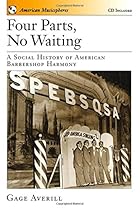Read Four Parts, No Waiting: A Social History of American Barbershop Quartet (American Musicspheres) by Gage Averill Online
Read ! Four Parts, No Waiting: A Social History of American Barbershop Quartet (American Musicspheres) PDF by # Gage Averill eBook or Kindle ePUB Online free. Four Parts, No Waiting: A Social History of American Barbershop Quartet (American Musicspheres) Four Parts, No Waiting investigates the role that vernacular, barbershop-style close harmony has played in American musical history, in American life, and in the American imagination. Averill demonstrates that the barbershop revival was part of a depression-era neo-Victorian revival, spurred on by insecurities of economic and social change. Starting with a discussion of the first craze for Austrian four-part close harmony in the 1830s, Averill traces the popularity of this musical form

| Title | : | Four Parts, No Waiting: A Social History of American Barbershop Quartet (American Musicspheres) |
| Author | : | |
| Rating | : | 4.92 (658 Votes) |
| Asin | : | 0195328930 |
| Format Type | : | paperback |
| Number of Pages | : | 320 Pages |
| Publish Date | : | 2013-12-17 |
| Language | : | English |
Four Stars Amazon Customer This book was a gift and it was a hit!. Nice Treatment Duane P. Johnson As a long time barbershop singer, I appreciated this treatment by a mostly disinterested author. It fills in a lot of blanks, and corrects a lot of mistaken assumptions about the history of barbershop music. With the current rising enthusiasm for youth choruses and quartets, history is still being made in this genre, and perhaps an addendum will soon be in order.. Very good Reader Guy "Four Parts" is authoratative but very readable. The accompanying CD has rare tracks that would be difficult to find anywhere else. If you want a book to help you understand barbershop and it's importance in the american art forms this is the best you will find.
In Four Parts, No Waiting Gage Averill has given us an elegantly written volume that should be read by anyone interested in the history of American popular music." --Ethnomusicology. "Averill generally manages to strike the necessary balance among the needs of disparate audiences: scholars, college students, and barbershop singers themselves
Gage Averill is Professor of Ethnomusicology at the University of Toronto and Vice-Principal Academic and Dean of the University of Toronto Mississauga. He serves as President of the Society of Ethnomusicology (2009-11).
Four Parts, No Waiting investigates the role that vernacular, barbershop-style close harmony has played in American musical history, in American life, and in the American imagination. Averill demonstrates that the barbershop revival was part of a depression-era neo-Victorian revival, spurred on by insecurities of economic and social change. Starting with a discussion of the first craze for Austrian four-part close harmony in the 1830s, Averill traces the popularity of this musical form in minstrel shows, black recreational singing, vaudeville, early recordings, and in the barbershop revival of the 1930s. This engagingly-written, often funny book critiques the nostalgic myths (especially racial myths) that have surrounded the barbershop revival, but also celebrates the civic-minded, participatory spirit of barbershop harmony. In his exploration of barbershop, Averill uncovers a rich musical tradition--a hybrid of black and white cultural forms, practiced by amateurs, and part of a mythologized vision of small-town American life. Barbershop harmony played a central -- and overlooked -- role in the panorama of American music. The contents of the CD have been replaced by a companion website with helpful links, resources, and audio examples.. Contemporary barbershop singing turns this nostalgic vision into lived experience. Arguing that the "old songs" function as repositories of idealized social memory, Averill revea
Download Four Parts, No Waiting: A Social History of American Barbershop Quartet (American Musicspheres)
Download as PDF : Click Here
Download as DOC : Click Here
Download as RTF : Click Here
